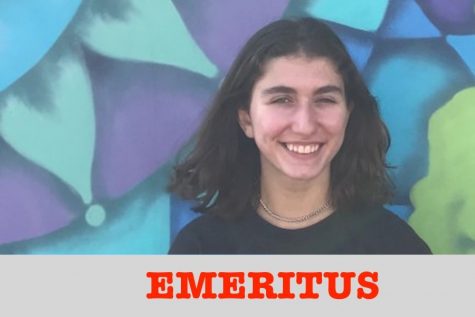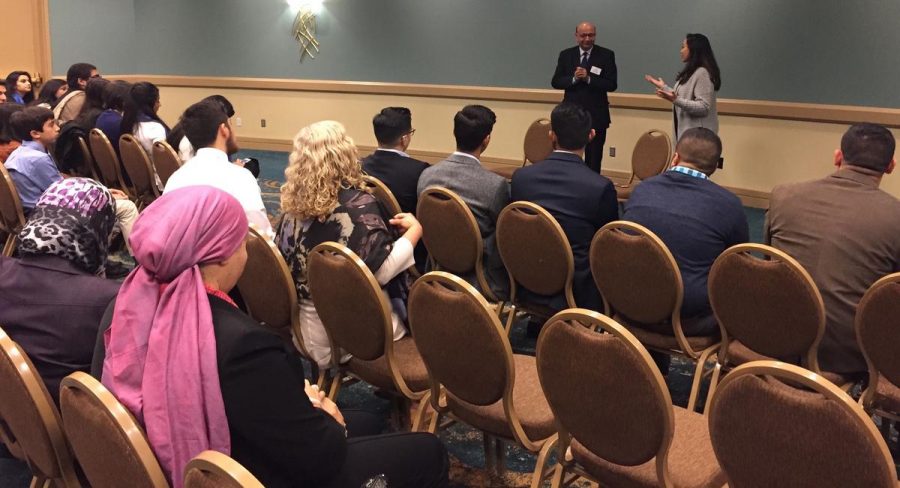Dem convention star Khan tells LA Muslims to plan, not panic, about Trump
American history has shown minorities can be secure if they fight for their rights under U.S. Constitution, he says
CRISIS: Khizr Khan says that many American Muslims including himself feel disconnected from society after the election and need that connection again.
Khizr Khan, who achieved fame when he reprimanded then-presidential candidate Donald Trump at the 2016 Democratic National Convention, told a worried audience of Southern California Muslims last week that they need not fear for their safety under President-elect Donald Trump.
“There is the Judiciary branch, the Supreme Court — it will take years before anything is implemented,” said Mr. Khan, who famously waved his copy of the U.S. Constitution before a television audience of millions at the Democratic National Convention last summer. “I want us to have faith in the system that we have, that is why I speak ad nauseum.”
In his hour-long talk, which was a part of the annual conference of the Muslim Public Affairs Council, Mr. Khan emphasized due process and impressed upon the audience that Muslim Americans, Hispanic Americans, and others targeted by Mr. Trump should “hearten themselves.”
But he believes new minorities in America will have to fight for their rights, as suffragists did in the early 20th century, and African Americans did in the days of Martin Luther King Jr.
“No one is going to serve you your rights on a silver platter,” Mr. Khan told the audience.
Mr. Khan’s son, Army Capt. Humayun Khan, was killed in 2004 in Iraq, and it was as parents of a Muslim war hero that his parents, Khizr and Ghazala, were invited to speak on the last night of the Democratic convention. Forty Muslims and a few friends gathered at the Long Beach Convention Center to hear him on Sunday, Dec. 11.
Also at the convention, Mr. Khan told then-candidate Donald Trump to look in the Constitution for the words “liberty” and “equal protection of law.”
“Donald Trump consistently smears the character of Muslims,” Mr. Khan said in August. “He disrespects other minorities — women, judges, even his own party leadership. He vows to build walls and ban us from this country.”
Those comments triggered Trump to attack Mr. Khan and his wife on Twitter.
The modest crowd at Long Beach looked to the recently famed Pakistani-born attorney for advice in light of their fears about the president-elect. Mr. Khan focused on educating and stamping out what he calls “the politics of fear.”
In his Virginia legal practice, he said, many children of immigrants have come to him concerned that their parents will be randomly deported, or detained by immigration officials.
He tells them that such a thing is “impossible, illegal, and that is unconstitutional.” The message was inspiring for many who felt their faith, whether America or the fate of their religion, was faltering in light of the election.
“I think it’s been a uniting thing, the post-election has brought us together,” said Farzana Rashid, a young Muslim woman from the Glendale Muslim community who attended the talk.
“But some of us feel confused, and are having an identity crisis, and need people to bring them the connection again. And that’s where I am, I need that connection.”
She said that Mr. Khan’s words of wisdom and inspiration grounded her to her religion and community.
Tahil Sharma, who was born to Sikh and Hindu parents, called Mr. Khan “uncle” when he posed his question during the remaining 10 minutes of the talk. “Uncle” is a well-known title of respect and admiration for elders among South Asian people.
Mr. Sharma asked how Muslims and minorities across varying cultures, religions and religious denominations could reconcile to “fight for the justice that requires a lot of energy?”
Mr. Khan replied that the groups must overcome their differences, and that “our Creator has created us all equally.”
In his closing remarks, Mr. Khan admitted that the Democratic party has a lot to fix in terms of leadership, as well as rebuilding and rising from the ashes of its recent defeat. Before everyone gathered for a group photo, Khan told the crowd — some just barely old enough to vote and some not — to not be partisan, admitting he voted for Republican president Ronald Reagan in the 1980s.

Hannah Jannol was Editor-in-Chief of the Boiling Point during the 2017-2018 school year. Since then, she has attended The New School and written for their HerCampus chapter; edited obituaries for The Trace; written poetry for Eleven and a Half literary magazine, and run Instagram and Twitter for Uptown Stories. Her favorite parts of being on Boiling Point were production night and writing long-form features stories, many of which won awards from CSPA, Quill & Scroll and the American Jewish Press Association.

